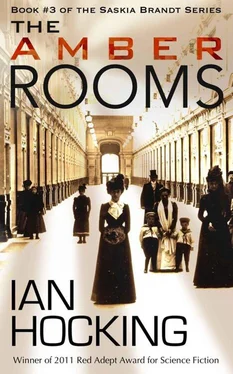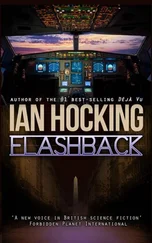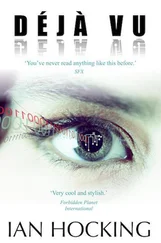‘It’s not loaded, is it?’
The butler nodded. ‘I came in here to fetch bullets. The Count keeps them in a drawer.’
Saskia tried to concentrate. Was Papashvily one of the men outside? Was he the type to storm the villa? Burn it? Wait for her to emerge?
‘You’d be safer leaving the gun here.’
‘Safer?’ The butler leaned on the desk. ‘Ms Tucholsky, the Count told me to protect you. I’m late of the British Army.’ He cleared his throat. ‘Now, help me find the bullets.’
‘You’ve already protected me,’ Saskia replied. ‘I appreciate it.’
‘The Count suggested that a quick escape might be effected if we were to use his boat. There is a passage that connects to it via the cellar. It is damp but useable. I am a formidable rower.’
Saskia looked at this man as she had looked at Yusha when he had stepped into the breach to protect the honour of those women, all those weeks before. Mr Jenner was too preoccupied with his pistol to react when she put her hand to his cheek. He stiffened, then relaxed. He smiled.
‘Thank you, Mr Jenner. That will be all.’
As he turned away, she struck him behind the head with her elbow. He staggered but did not fall. Saskia frowned. Perhaps he boxed regularly or had some form of congenital thickness of the occipital bone. She struck him once more and guided his weight to the floor. There, she placed him in a position where he could breathe freely.
There was no time to look for bullets, but she took the gun anyway. Then she pulled the slipknots on her boots and kicked them off and hurried from the room. Her stockinged feet were silent.
The hallway was too dark. She paused. I need to see. Part of her mind answered in dull, monochrome shapes with false positive edges, redrawn and redrawn. She closed her eyes, centred herself, and opened them. The scene settled into an impressionistic sketch. She tucked her chin against her chest, readied herself for the imbalance caused by her missing hand, and sprinted from the house, knowing it all before her foot touched a flagstone. The veranda was empty but for potted plants and wooden garden furniture. The steps leading up to the higher garden were on her left. She would make that her route.
There was too much light. Dazzling in contrast to the darkness inside. It was coming from the lantern of a man in the garden. He was holding it high with his left hand. It revealed his face: Papashvily. In his right hand was a gun, and a minuscule spark of ignition had already escaped it.
Saskia felt the wash of air as the bullet passed her shoulder, and then she heard its shot, and she dropped her hip and rolled across the flagstones. The world swung around her. As she came upright, she added the energy of her movement to the flick in her arm. The pistol left her fingers precisely as she intended: just the heft, just the smoothness, and with enough spin to hold it true throughout its flight.
Papashvily shot one more bullet before the pistol struck him below the nose. He snarled and twisted backwards. The sudden turn had more to do with surprise than the force of the throw. However, the pistol was heavy and it caught him fully. He fell to the ground and dropped the lantern.
Saskia closed the distance. She stamped on his throat with the ball of her foot. It would have killed most men. He gurgled a scream but did not drop the gun. It fired once more. She took his wrist and bit it hard. The hairs tickled her lips. Papashvily released the gun.
Somewhere, men shouted (two; young; Russian) and dogs barked (two; large; Rottweiler). The men were lookouts posted at the front of the villa. She had thirty seconds until they reached her, if she were lucky. Maybe longer if the dogs were poorly trained.
Saskia and Papashvily looked at one another. Both were breathing hard. Papashvily smiled. His front teeth were missing and his nose had been flattened.
‘If I don’t break you,’ he said, in Georgian, ‘they will.’
Saskia looked along the villa to the east wing. The lawn there was growing brighter. The first of the men was approaching with his lantern.
She shot Papashvily through the pair of muscles that formed his calf. He screamed and clutched at it.
There was a line of trees ahead. It was the southern flank of an orchard. Saskia sprinted to the trees. There she waited with her back to a trunk. Apple. Their blossoms were white against the darkness, and despite the season a sharp wind blew down the hill.
She thought about the gun. Two bullets left. Two dogs and two men.
The first dog bounded almost playfully from tree to tree. Saskia tracked it with her muzzle. She steadied the weapon on her forearm, exhaled, and shot the dog through an eye when he was five metres away. The animal skidded and yelped. It worked its jaw as though there was something in its mouth. Then it twisted against the ground, dead.
She did not see the second dog until it was almost upon her. Through some hunting instinct, it had worked towards her flank while she dealt with the first. Its attack was hard and deliberate. There was no bloodlust. The dog meant to take her cold.
Its shoulders reflected the moonlight. A bluish-black coat. Rottweiler. Front teeth bared. Slow breath. Silent footfalls. Like a cat.
Saskia shot it through the chest. The wound glistened like a splash of mud. Undeterred, the dog came on. She turned, knowing she could not outrun it and knowing the dog had the advantage of weight and speed.
It leapt.
Jem , Saskia thought.
The dog knocked her against the tree. Its claws ripped at her coat and its head turned horizontal, the better to grasp her throat.
Saskia felt a decoupling at her core. The device at the rear of her brain stepped into a faster mode. Her mind was cast upwards, as though it were travelling in an elevator through the tallest building in the world. She looked down on reality—on the meat of her body—and saw it move with the slowness of a giant.
She heard a buzz. As she rose, higher still, the buzz dropped in pitch until it became the flapping of bird wings.
The sparrows .
Where am I? she thought.
The pain had reduced to its informational component alone. She saw the dog’s jaws snap on the air in front of her nose. The sound was low, like a far away explosion. The skin around its mouth rippled.
Ute?
The animal shook its head. Streamers of saliva flew left and right.
She saw a grey, swirling ground. It passed beneath her. Then she fell towards it. The patterns rushed out to become an immense field of sparrows. Their details were blurred, as though sketched in charcoal. The sound of their calls decreased as she fell until, at length, every bird was silent.
A sparrow said something.
It was too far away for Saskia to make out the words.
What? she said. What did you say?
She heard a second, closer sparrow repeat the words, but some of the sounds had changed. A third sparrow, closer still, repeated the words. Again they changed. Sparrow after sparrow carried the message to her.
Sparrow speaks to sparrow speaks to sparrow.
What are you saying?
At last, the closest sparrow turned to her and said, ‘Grey growth conceals the anger.’
What? What?
Another said, ‘Grade growing covers the rage.’
Ute, the sparrows are talking to me. What are they saying?
Below, her arm took position in front of her face and the dog bit her. Its teeth passed through to the bone and locked.
Scraping.
The eyes of the dog were pale rings on darkness, like the halo around the moon.
Saskia felt herself slipping. The fall, when it came, was like a fall in a dream. She tumbled and screamed. The flapping of the unseen sparrow wings blurred into a single tone, and the tone increased in pitch. At the same time, a terrific pain in her arm blotted out all thought, until she was back in her body.
Читать дальше












